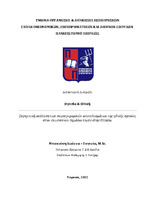Ηγεσία & ηθική : συγκριτική ανάλυση των συμπεριφορικών αποτελεσμάτων της ηθικής ηγεσίας στον ιδιωτικό και δημόσιο τομέα στην Ελλάδα

Doctoral Thesis
Συγγραφέας
Μπακούνη, Ιωάννα - Ευγενία
Ημερομηνία
2022-06-15Επιβλέπων
Χυτήρης, ΛεωνίδαςΠροβολή/
Λέξεις κλειδιά
Ηθική ηγεσία ; Οργανωσιακή συμπεριφορά ; Οργανωσιακή ψυχολογία ; Θετικές εργασιακές στάσεις ; Θετικές εργασιακές συμπεριφορές ; Αρνητικές εργασιακές συμπεριφορές ; Μοντελοποιήση δομικών εξισώσεων ; Δημόσιος τομέας ; Ιδιωτικός τομέαςΠερίληψη
Η παρούσα διατριβή πραγματεύεται το ζήτημα της ηθικής ηγεσίας, χρησιμοποιώντας μια θετικιστική προσέγγιση. Σκοπός της διατριβής αυτής είναι να παρουσιάσει και τεκμηριώσει ένα ολιστικό μοντέλο το οποίο αντανακλά την σχέση μεταξύ ηθικής ηγεσίας και εργασιακής συμπεριφοράς των εργαζομένων και εξηγεί τους μηχανισμούς που διέπουν αυτή τη σχέση. Η ανάλυση που ακολουθεί είναι συσχετιστική και συγκριτική μεταξύ του δημόσιου και ιδιωτικού τομέα στην Ελλάδα, σημείο που αποτελεί μια σημαντική συνεισφορά της παρούσας έρευνας καθώς δεν έχει δοκιμαστεί ανάλογο μοντέλο ταυτόχρονα για τους δύο αυτούς τομείς, στην Ελλάδα. Πέρα από την συνεισφορά για τον κλάδο της οργανωσιακής ψυχολογίας / συμπεριφοράς στην Ελλάδα, το μοντέλο αυτό δοκιμάζει ταυτόχρονα πάνω από μια διαμεσολαβητική μεταβλητή, με στόχο να αναδείξει την πολυπλοκότητα του φαινομένου της ηθικής ηγεσίας.
Η μεθοδολογία που ακολουθήσαμε ήταν κατά κύριο λόγο ποσοτική, όμως στην πιλοτική φάση της έρευνας χρησιμοποιήσαμε μεικτές μεθόδους (ερωτηματολόγιο και συνέντευξη). Το τελικό μας δείγμα είναι επαρκές για γενίκευση των αποτελεσμάτων, καθώς αποτελείται από 357 μονάδες στο σύνολο, εκ των οποίων τα 257 ερωτηματολόγια αφορούσαν τον ιδιωτικό τομέα και τα 100 τον δημόσιο, ενώ προσπαθήσαμε να είναι αντιπροσωπευτικό ως προς τα δημογραφικά χαρακτηριστικά. Η ηθική ηγεσία μετρήθηκε με την κλίμακα Ethical Leadership Questionnaire (Yukl et al., 2013), μεταφρασμένη στα ελληνικά, εφόσον πρώτα είχε δοκιμαστεί πιλοτικά και δευτερευόντως είχαμε πραγματοποιήσει συνεντεύξεις για την κατανόηση του ερευνητικού εργαλείου. Οι υπόλοιπες μεταβλητές συντέθηκαν από μονο-στοιχειακές κλίμακες (single – item scale), ώστε να διασφαλίσουμε την συμπλήρωση του ερωτηματολογίου, λαμβάνοντας υπόψη ότι το δείγμα μας είναι εργαζόμενοι με περιορισμένο χρόνο. Το εργαλείο μέτρησης που χρησιμοποιήσαμε, σαν σύνολο και σαν επιμέρους κλίμακες, παρουσίασε υψηλή αξιοπιστία, και για το σύνολο του δείγματος και για τα επιμέρους δείγματα (δημόσιο – ιδιωτικό). Ελέγξαμε για διακρίνουσα εγκυρότητα και για ζητήματα πολυσυγγραμικότητας και οι έλεγχοι μας δεν έδειξαν προβλήματα όσον αφορά αυτά τα ζητήματα.
Η μοντελοποιήση χρησιμοποίησε την μέθοδο των Δομικών Εξισώσεων (Structured Equation Modelling). Μέσω της χρήσης αυτής της μεθόδου συνολικοποιήσαμε σε ένα κατανοητό μοντέλο το σύνολο των παρατηρήσεων μας και αποδείξαμε ότι η ηθική ηγεσία μέσω στοιχείων της σχέσης ηγέτη – υφισταμένου (εμπιστοσύνη, ψυχολογική ενδυνάμωση, αυθεντικότητα, ποιότητα σχέσης) επηρεάζει θετικά τις θετικές εργασιακές στάσεις (εργασιακή ικανοποίηση, δέσμευση, αισιοδοξία ,σημαντικότητα εργασίας και οργανωσιακή ταύτιση), το οποίο επηρεάζει θετικά τις θετικές εργασιακές συμπεριφορές (επιπλέον προσπάθεια, εθελοντικές συμπεριφορές και καινοτόμος εργασιακή συμπεριφορά), αρνητικά τις αρνητικές εργασιακές συμπεριφορές (αντιπαραγωγικές συμπεριφορές και πρόθεση για αποχώρηση) και εντέλει τα ατομικά αποτελέσματα θετικά (απόδοση, παραγωγικότητα, αποτελεσματικότητα). Αυτές οι συσχετίσεις αποδείχθηκαν τόσο για τον ιδιωτικό τομέα όσο και για τον δημόσιο, χωρίς να παρατηρούμε κάποια ουσιώδη ερευνητική διαφορά μεταξύ των δύο τομέων. Από τις συνολικά εφτά ερευνητικές μας υποθέσεις επιβεβαιώσαμε τις έξι, ενώ μια απορρίφθηκε.
Η παρούσα μελέτη παρέχει ουσιώδη συνεισφορά τόσο σε ακαδημαϊκό όσο και σε πρακτικό επίπεδο. Σε επιστημονικό επίπεδο, εμβαθύνουμε την κατανόηση της ηθικής ηγεσίας και τεκμηριώνουμε σφαιρικά την επιρροή της σε διαφορετικούς οργανωσιακούς τομείς. Σε πρακτικό επίπεδο, ευελπιστούμε ότι τα πορίσματα της έρευνας θα επηρεάσουν τους επαγγελματίες της διοίκησης ανθρώπινού δυναμικού σε ποίκιλες πρακτικές, όπως η επιλογή και η εκπαίδευση. Ειδικά όσον αφορά την εκπαίδευση των ηγετών, κρίνουμε ότι μέσω των πορισμάτων της έρευνας εδραιώνουμε την ανάγκη για ένταξη στοχευμένων εκπαιδευτικών προγραμμάτων ανάπτυξης ηγετών με βάση ηθικά πρότυπα.


